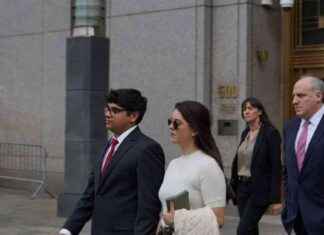He expresses his doubts about the regulation of cryptocurrencies, because it would mean giving them a credibility that, in his opinion, they do not have
MADRID, 17 Abr. (EUROPA PRESS) –
The “relative” stability enjoyed after the Cold War “could be giving way to one of permanent instability” that reduces economic growth, increases costs and adds uncertainty to international trade, warned this Monday the president of the European Central Bank ( ECB), Christine Lagarde, in a conference at the ‘Council on Foreign Relations’.
The French woman has warned that the fragmentation of the world economy into opposing blocs is, paradoxically, a global phenomenon. Lagarde has claimed, citing a recent study, that geopolitical risks “inevitably lead” to higher inflation, slower economic dynamism and a contraction of trade.
A situation that has contrasted with that experienced with the post-Cold War order, which allowed the “flourishing of international institutions”, the expansion of trade, and central banks “focusing on stabilizing inflation by adjusting demand without having to to worry too much about supply”.
Thus, Lagarde has encouraged to dismantle this trend driven by the new geopolitical reality “reinforcing and diversifying supply chains, or saving energy” to create a “virtuous circle” that reduces volatility, contains inflation and spurs investment.
On the other hand, the president of the ECB has urged European countries to address “long-delayed projects” such as the deepening and integration of capital markets, which must be addressed holistically, and not only from a purely national perspective.
Lagarde has assured that completing the capital markets union at the European level will be “critical” to know if the euro will continue to be one of the main currencies in the world in the future, or will it give way to the Chinese yuan or the Indian rupee, for example .
In monetary policy, he has defended the interest rate hikes undertaken by the ECB as “useful” because “they are beginning to work”, although he has also recognized that the statistical base effect, the fall in oil prices and the minor disruptions to supply chains have played a role in containing inflation.
Looking to 2023, the projection of the price rise will be 5.3%. In this regard, Lagarde has stated “that there is no reason to modify the [current inflation] objective of 2% in the medium term.” “Central banks must provide stability at a time when there is anything but stability,” he summarized.
Lagarde has also been optimistic about the ability of Europeans to overcome these challenges, citing as an example the speed with which they have shed their dependence on Russian gas, saving beyond the 15% gas initially proposed by the European Commission.
Lagarde has defended the cooperation between the United States and Europe as one that “transcends the pure definition of friendship” and that materializes in ties and joint projects, such as those aimed at jointly locating and exploiting rare earths. Asked if this can be done without protectionist measures, Lagarde has stated that it is possible, but without elaborating how.
It has also championed cooperation at a more general level, “because we are interdependent”; “What happens in the US matters in the rest of the world, […] what happens in Europe can also affect the rest of the world,” she pointed out.
Referring to China, Lagarde has estimated that Beijing’s role in the international financial system can be useful for debt restructuring in low-income and fragile countries.
Likewise, integrating the Asian country into the international financial system is reasonable, since “it cannot be that some of the large emerging economies […] obtain a relatively small part of the pie.” In addition, this would avoid the reinforcement and creation of institutions that rival the existing ones, further fragmenting the economy.
The president of the ECB has referred to cryptocurrencies, about which she has said that “they are not currencies” and that those that claim to be “assets are rather liabilities”. On a personal note, the gala “has its doubts about whether they should even be regulated.”
“I wouldn’t want to regulate them when, unfortunately, cybersecurity is falling behind,” he reasoned. “We must not try to endow them […] with a credibility and prestige that they neither deserve nor demonstrate,” she added.
Likewise, Lagarde has assured that she “respects that people want to create speculative instruments”, as long as they are prepared to lose their investment. Similarly, he has expressed concern about the interest that cryptocurrencies arouse among young people “who don’t really understand what they are getting into.”
In this sense, the French company has defended the digital euro as a secure means of payment backed by a central bank that will protect the privacy rights of citizens and that will adapt to an increasingly digital society.







